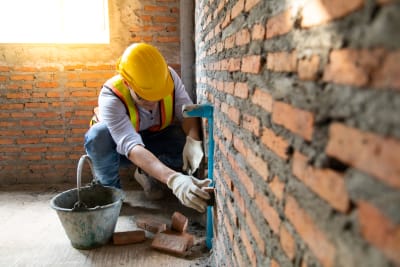Masons in Pennsylvania can specialize in several fields, including brick, cement, stone, and terrazzo masonry. Moreover, they can specialize even further under any of these categories by, for instance, working with specific structures and materials, including granite, marble, paving stones, and more.
Regardless of their specialization, however, training is one aspect of becoming a masonry worker in Pennsylvania that must be considered, along with basic requirements.
To that end, we have provided below a detailed look at the broad steps involved in becoming a mason in Pennsylvania, a list containing some of the best training programs in the state, and the potential salary to expect on the job.
How to Become a Masonry Worker in Pennsylvania
To become a masonry worker in Pennsylvania, aspiring candidates must follow the framework highlighted below:
Provide a High School Diploma or GED
A prospective masonry worker in Pennsylvania needs a high school diploma or a GED equivalent to begin their careers. This usually comes in handy when securing admission into training programs.
Apprenticeship programs also often ask for either of these credentials.
Choose a Training Option
It is common to consider one of three approaches to obtain training as a prospective masonry worker in Pennsylvania. These include enrolling in an academic training program, an apprenticeship program, or working as a masonry assistant.
- Enrolling in a Formal Training Program – Becoming a mason in Pennsylvania is possible by attending a formal college or trade school program. The diploma or degree obtained from a formal training program often goes a long way in helping graduates secure employment.
- Enrolling in an Apprenticeship Program - Apprentice programs are responsible for producing competent masonry workers. They use a framework that ensures students obtain a solid foundation in classroom topics and actual hands-on training in the real world.
- Working as a Masonry Assistant - Another way to become a masonry worker in Pennsylvania is to work as an assistant to an experienced mason. Doing this for a couple of years usually results in having the needed real-world experience and technical solidity to enjoy a successful career in the field.
Of course, it is also possible to combine two or more of the above approaches by, for instance, working as a masonry assistant for a few months after graduating from a formal training program or combining formal training with a brief stint as an apprentice.
Consider Trades with Similar Paths:
Top Masonry Schools in Pennsylvania
The following are some of the best masonry programs in Pennsylvania:
Trade Institute of Pittsburgh
Pittsburgh, PA Campus Only
The Trade Institute of Pittsburgh is one of Pennsylvania's most popular training centers for aspiring masons. The institute is known for its quality instructors and modern facilities.
Tuition
FreeContact
(412) 243-2970
info@tipgh.org
Western Area Career and Technology Center
Pittsburgh, PA Online + Campus
Graduates of the masonry program at the WACTC can work in several fields, including block laying, tile setting, and stone masonry, among others.
Tuition
$5,705 - $8,724Contact
(724) 746-2890
ssmith@wactc.net
Notable Mentions
Other notable destinations for aspiring masons in Pennsylvania to obtain quality training include Sun Area Technical Institute in New Berlin, the Career Technology Center of Lackawanna County in Scranton, York County School of Technology in York, Monroe Career and Technical Institute in Bartonsville, Lehigh Career and Technical Institute in Schnecksville, and Indiana County Technology Center in Indiana.
Explore Masonry Schools by City:
State Licensure and Certification Requirements
According to the Pennsylvania Department of Labor and Industry, the Commonwealth of Pennsylvania does not have general licensure or certification requirements for its masonry workers.
Licensure only comes into play in particular circumstances, such as making manufactured houses, crane operation, and asbestos and lead removal.
Additionally, even though there are no certification requirements, masons in Pennsylvania may choose to obtain certification anyway. Certified masons may enjoy various benefits, including career growth possibilities, continuing education, and networking.
Salary and Job Outlook
According to a survey by Indeed, masonry workers in Pennsylvania earn an annual average salary of $44,145, which is practically on the same level as the national average for other states combined.
Of course, not everyone will fall close to this value. Masonry workers in the state who fall into the top ten percent will earn as much as $63,824, while those who fall into the bottom ten percent (such as entry-level workers) will earn as much as $30,533.
Pennsylvania’s highest-paying cities for masonry workers include Allentown, with an annual average salary of $53,083; Kintnersville, with an average yearly salary of $51,550; and Lancaster, with an average annual wage of $44,018.
Masonry workers in Pittsburgh and Pennsylvania earn an annual average salary of $40,250 and $42,409, respectively.





